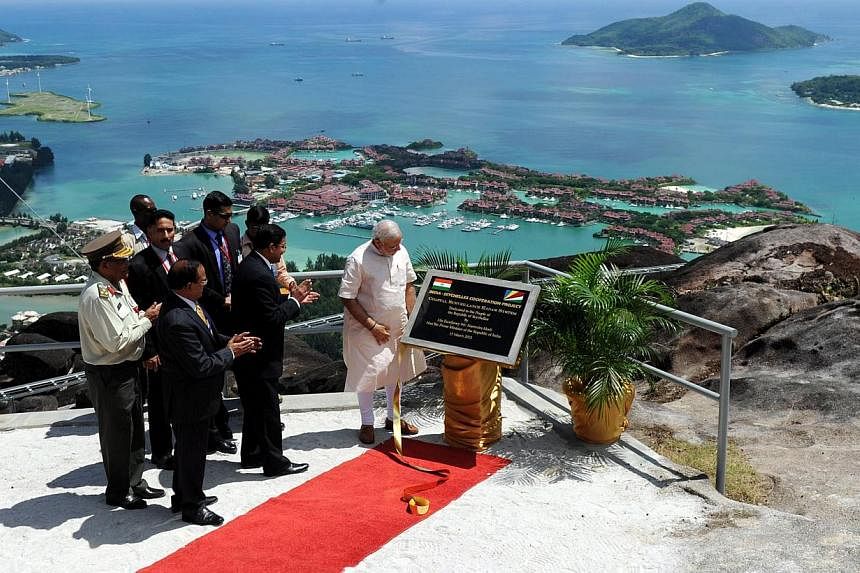Indian Prime Minister Narendra Modi's Indian Ocean visit inspired dramatic headlines and generated acres of commentary. One news portal even proclaimed, "China out, Modi ensures 'Indian Ocean is India's ocean'."
Media excitement about Mr Modi's visits to Seychelles, Mauritius and Sri Lanka is understandable, coming as it does after decades of India's indifference to its own backyard. But one should not lose perspective.
Mr Modi's initiative is indeed a first and long-overdue pushback against the notion of China's inexorable ascendancy in the Indian Ocean, but New Delhi is a long way from countering Beijing's growing economic and military clout. India's policymakers would do well to remember that if they act in haste to gain a foothold in the island nations, it could provoke a reaction that would increase China's attraction as a counter-balance.
Indeed, it is China's overreach in Sri Lanka that has now given India an opportunity to redress its past neglect. During the years when India was consumed by domestic politics and its land borders, China made significant headway in forging ties with Colombo. Of course, Sri Lanka's international isolation gave China a free hand and enabled it to finance the US$306 million (S$425 million) port of Hambantota, where it secured a 35-year lease of over half of its container berths.
In a similar vein, Chinese submarines and naval vessels recently berthed at the South Container Terminal in Colombo Port, which is operated by a Chinese firm. Likewise, the US$1.4 billion Beijing-funded Colombo Port City project includes provisions whereby more than one-third of the land would have gone to China on a 99-year lease, even though Sri Lankan law prohibits foreign companies from owning real estate.
Suspicions of massive graft surrounding these projects were a key factor in the defeat of former Sri Lankan president Mahinda Rajapaksa, who was viewed as being in China's pocket. In contrast, the newly elected government of Mr Maithripala Sirisena has suspended the port city project and launched a probe into potential wrongdoing by the previous administration. It has also expressed its desire to rebalance its relations with China, thus giving India an opening to regain lost ground.
But Sri Lanka faces a considerable debt burden with China and 60 per cent of its military hardware is of Chinese origin. New Delhi can match neither Beijing's deep pockets nor its appeal as a potential counter-balance to a large and occasionally meddlesome neighbour. Sri Lanka has a long and proud history of non- alignment, which India should be sensitive to in its dealings with the new leadership in Colombo.
Mr Modi is right, as he did in Mauritius, to express pride in the accomplishments of Indian immigrants and recall the "powerful links of heart that have endured time and distance". But there is always a danger of over-emphasising ethnic and historical linkages and provoking backlash among young and globalised nations. The danger may be greater when a foreign country is viewed as domineering, as happened to China in Sri Lanka.
India has taken responsibility for infrastructure building in two nations - Mauritius and Seychelles. How the projects are run will be scrutinised by the people, and India should remember that China's use of its own labour in projects such as those in Sri Lanka bred local discontent.
China's aggressive promotion of its claims in the South China Sea and its growing naval presence in the Indian Ocean have made small nations wary and caused them to make overtures to India. New Delhi's offer of help in protecting Sri Lanka's exclusive economic zone will have to be accompanied by restraining Indian vessels from illegal fishing. The new Sri Lankan government's threat to shoot Indian fishermen in its waters is a reminder of the sensitivities India needs to bear in mind.
The Indian Ocean countries were indeed warm to Mr Modi, but their goodwill will last only if his government remembers that the ocean is not actually India's.
The writer is editor-in-chief of YaleGlobal Online, published by the MacMillan Centre, Yale University.

